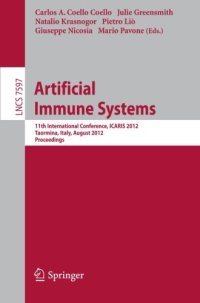
Ebook: Artificial Immune Systems: 11th International Conference, ICARIS 2012, Taormina, Italy, August 28-31, 2012. Proceedings
- Tags: Simulation and Modeling, Artificial Intelligence (incl. Robotics), Computation by Abstract Devices, Algorithm Analysis and Problem Complexity, Pattern Recognition, Information Systems Applications (incl. Internet)
- Series: Lecture Notes in Computer Science 7597 Theoretical Computer Science and General Issues
- Year: 2012
- Publisher: Springer-Verlag Berlin Heidelberg
- City: Berlin ; New York
- Edition: 1
- Language: English
- pdf
This book constitutes the refereed proceedings of the 11th International Conference on Artificial Immune Systems, ICARIS 2012, held in Taormia, Italy, in August 2012. The 19 revised selected papers presented were carefully reviewed and selected for inclusion in this book. In addition 4 papers of the workshop on bio and immune inspired algorithms and models for multi-level complex systems are included in this volume. Artificial immune systems (AIS) is a diverse and maturing area of research that bridges the disciplines of immunology, biology, medical science, computer science, physics, mathematics and engineering. The scope of AIS ranges from modelling and simulation of the immune system through to immune-inspired algorithms and in silico, in vitro and in vivo solutions.
This book constitutes the refereed proceedings of the 11th International Conference on Artificial Immune Systems, ICARIS 2012, held in Taormia, Italy, in August 2012. The 19 revised selected papers presented were carefully reviewed and selected for inclusion in this book. In addition 4 papers of the workshop on bio and immune inspired algorithms and models for multi-level complex systems are included in this volume. Artificial immune systems (AIS) is a diverse and maturing area of research that bridges the disciplines of immunology, biology, medical science, computer science, physics, mathematics and engineering. The scope of AIS ranges from modelling and simulation of the immune system through to immune-inspired algorithms and in silico, in vitro and in vivo solutions